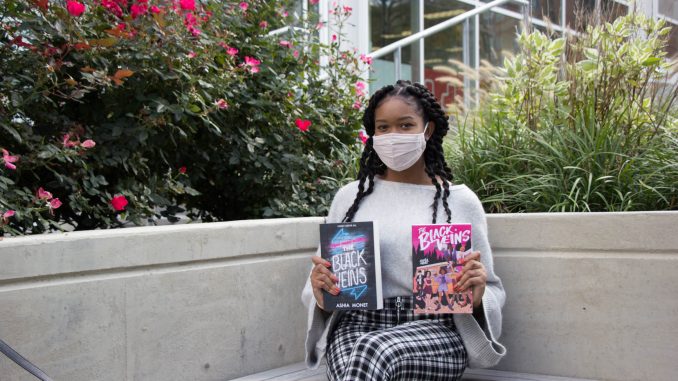
During a difficult freshman year of college, Ashia Monet Burns needed a project. Tucked away was a story she had thought about since age 14, and this seemed like the perfect time to bring it to life.
While she initially hoped to move on from the series after writing it, she realized it had potential.
Burns, a senior psychology major, self-published her debut novel “The Black Veins” in July 2019 under the name Ashia Monet. The first of a contemporary young adult fantasy series, it follows Blythe Fulton, a bisexual Black girl, an identity Burns shares. Blythe is a powerful magician called a Guardian whose family is kidnapped during a magician war. In order to find the other Guardians and save her family, Blythe goes on a road trip across the United States.
The Guardians start out as a mismatched group before becoming an inseparable found family, a group that is not blood related yet love and support each other as a family would.
The idea of a found family within the LGBTQ community has existed for decades, said Rob Faunce, an assistant English professor with expertise in queer theory and gender studies.
“In the 60s and the 70s, it wasn’t uncommon for young people to leave their homes and never go back and find their own communities,” Faunce said. “Now, so much of it is about emotional needs being met. It’s not just okay anymore to just be alive and be queer, but rather to actually thrive and to be surrounded by people who support you and your identity.”
Burns drafted the entire series while at Chestnut Hill College, before transferring to Temple University. Burns wrote it as a fantasy with magic and monsters and wanted to incorporate more personalized elements, she said.
“There were also things that I wanted on a personal level, which was a group of people whom I could love and trust and I felt would also love and trust me in turn,” Burns said.
Burns expected the book to fade in popularity after publishing it last year, but continues to be surprised when people tag her in pictures on Instagram sharing how much the book means to them.
“It was really exciting and so empowering to see all this positive buzz of people who were having a good time with the book and talking about how they felt represented and how important it was for them,” Burns said.
Amir Methvin, a sophomore psychology major, met Burns right as she was finishing the self-publication process.
Methvin understands the difficulties writers of color may face in spaces saturated by white voices, she said.
“It’s hard sometimes to feel like you have a space that you can be listened to and that the type of storytelling you’re interested in talking about wants to be heard,” Methvin added.
Methvin believes Burns’ book paves the way for other queer writers of color to self-publish and be successful at it, she said.
While LGBTQ books are becoming increasingly popular in young adult literature, many are focused on the experience of white queer people and when there are LGBTQ characters of color, they are usually sidelined as love interest or written by white authors, Burns said.
“Queer authors of color are still disenfranchised and considered double-bound by homophobia, transphobia, other phobias along with racism,” she added. “So, it’s this double-bind of not being able to have our voices heard or get our voices out there, and you end up with white queer authors who have a much easier time being published having these depictions of us that aren’t accurate or use us to sprinkle in a little bit of diversity.”
Burns didn’t want Blythe’s character to focus on the hardships of being a queer Black person. Instead, she wanted “The Black Veins” to be fun and escapist.
“I didn’t want to focus on the difficulties,” Burns said. “I just mostly focused on the way through which I view the world and the ways in which I love my identity.”
Currently, Burns is working on “Dracula Hit Squad,” an adult gothic horror stand-alone. The book is different from “The Black Veins,” as it follows a girl who is forced to marry Dracula and enlists characters like Frankenstein and Dorian Gray to help her kill him, Burns said.
As for the “Dead Magic” series, Burns says she hopes to have the second book out soon.
“I have a lot of projects that I’m really excited about,” Burns said. “Most of which are queer and feature queer people of color. I feel like that’s my brand at this point, queer people of color doing things in science fiction or fantasy.”



Be the first to comment